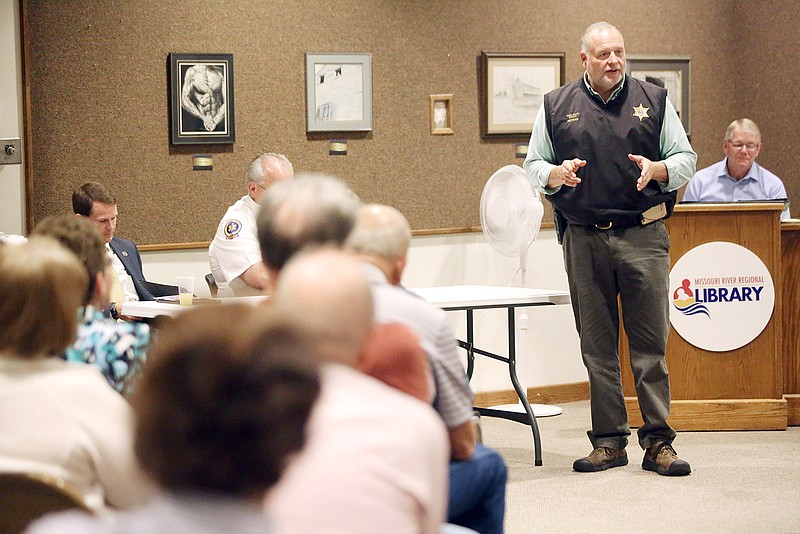A panel of local first responders Thursday said the most important takeaway from working in a post 9/11 world is establishing relationships among the public and reminding people to say something if they see something suspicious.
"Be apart of who we are because we want your involvement," Capt. Doug Shoemaker, of the Jefferson City Police Department, said. "The more we work together the better off we'll be."
The Missouri River Regional Library and Operation Bugle Boy hosted a panel of six first responders from different agencies across Cole County to discuss how their roles have changed since the terrorist attacks in September 2001.
Among the panel was Jerry Johnston, director of Cole County Emergency Medical Services; Capt. Paul Kerperin, Missouri Highway Patrol; Matt Schofield, fire chief of the Jefferson City Fire Department; John Wheeler, sheriff at the Cole County Sheriff Department; Chad John special agent with the Federal Bureau of Investigation; and Shoemaker.
Maj. Dale Schmidt and Retired Cole County Sheriff Greg White were also keynote speakers during the evening, both emphasizing how citizen participation is one aspect of how responders have always been able to do their jobs effectively.
White said one thing law enforcement has done better since 9/11 is share information.
Each representative of the individual agencies shared the importance of the public working with them, but also advised people not to let terrorism ruin their plans and to live their lives.
Kerperin, who oversees the division of drug and crime patrol in the Highway Patrol, shared that last year in Missouri there were more than 970 people killed in traffic crashes, illustrating how the prevalence of crashes are higher than a terroism attack happening in the state.
"I'm not telling you not to be vigiliant, but dont let terrorism affect your daily life," Kerperin said.
He noted after 9/11 the Highway Patrol has formed relationships with managers of utility companies and owners of infrastructures so they would feel comfortable speaking with law enforcement if a problem arises or they see something suspicious.
Keperin said they have also added the Missouri Information Analysis Center - one of 72 fusion centers in the nation that shares data among local, state and federal authorities - and has assigned three people in his division as organized crime anti-terrorism officers who work closely with the FBI.
"We're only as good as the information we get. We need the help of the public to make things happen," he said.
At the local level, Shoemaker said he remembers when orders came down from the president and federal government, explaining law enforcement is the first line of defense against domestic terrorism.
Prior to 9/11, the focus was on community policing efforts, he explained, where this initiative helped to break down traditional barriers among the community and law enforcement. During that time, federal funding was used to help add officers to the force to carry out those tasks.
Shoemaker said they currently focus on training and preparation for something that could happen locally.
For local first responders, post 9/11 means a lot of training for active shooter situations, with other agencies, inoperability and communications, he said. Adding more hats for officers to wear as technology and the world around them continues to change.
"Our job is to get better at telling you what we're doing and how we're going to protect you," Shoemaker said.
With Schoefield working with the fire department and Johnston working with EMS, they each shared how their world has drastically changed with the level of training and new-found inclusion in the public safety arena.
Johnston said when he first started in EMS, they were looked at as a healthcare agency, working in white smocks as opposed to the formal uniforms used today.
"Because of what happened in 9/11 it really changed the focus of EMS, we're now part of the public safety continuum and train with law enforcement and other first responders," Johnston said.
Schofield echoed Johnston's sentiment explaining how fire fighters think of themselves in a very traditional light, but post 9/11 they have been trained as EMS, how to identify hazardous materials and weapons of mass destruction, what to do in bomb and blast investigations, and technical rescue scenarios.
He said this can be one of the biggest challenges because it can be a strain on staff availability, resources and finances.
"This job that we all do is not a job; it's a calling," Wheeler said. "Cole County has a great public safety team. We got your back."

